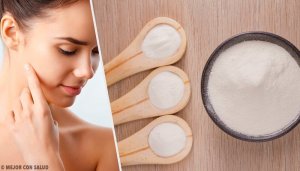7 Benefits of Taking Collagen Daily

Many people believe that, in order to maintain a beautiful and healthy skin for a longer period of time, taking collagen daily becomes necesary after a certain age.
Often, we may see advertisements for all kinds of products with collagen (creams, lotions, masks, among others) for skin care. We may also have seen supplements with this element (in the form of powders, capsules, tablets, etc.).
But do we really know what collagen is, what it can do, and how we can take advantage of it? Let’s find out below.
What is collagen?
Collagen’s a protein present in the body. It’s one of the most abundant components in the skin and bones. Therefore, it’s associated with the formation of bone cells, cartilage, and skin.
In fact, Dr. Elisa Martin Cano defines it as “the most important protein in the body” and comments that its function isn’t only to provide elasticity to tissues, but also support and resistance.
What happens when we take collagen?
When taking collagen, the body doesn’t produce this same substance, but divides it into its components (which are amino acids) and will form any protein. So, when we take a collagen supplement, we don’t help the body to generate it.
In other words, when we ingest a collagen supplement, it doesn’t go directly to the scar we want to remove or the knee joint we want to improve.
Instead, it’s broken down into amino acids, which remain free in the body and can be used to form cartilage at the tip of the toe (to make a nail, for example) or to grow hair on the head.
7 benefits of taking collagen daily
For all these reasons, the consumption of collagen supplements is considered to be potentially beneficial to health. In fact, this has been studied several times.
Let’s see what is usually associated with the daily consumption of collagen supplements, within a healthy lifestyle.
1. It may help to nourish the muscles

It’s believed that, to achieve a healthy, lean, and well-toned body, collagen should be taken to provide extra nutrition to the muscles. This could also help make recovery easier after the most intense workouts.
However, there’s no evidence that such benefits can be obtained by taking collagen supplements. Therefore, it’s best to maintain good lifestyle habits and follow your doctor’s instructions.
Also read: 5 Foods to Include in Your Breakfast to Strengthen Your Muscles
2. Improves your skin health
It’s also believed that taking collagen could promote the generation of new cells and, with this, it could perhaps eliminate the most recent scars that it may present. However, as we mentioned before, when taking collagen, it doesn’t go precisely to the point that one wishes to ‘repair’.
A study published in 2015 concluded that taking supplements with specific collagen peptides orally can contribute to skin health and improved skin structure.
3. It also improves bone and joint health.
It ‘s believed that taking collagen supplements (without consulting a doctor) may help maintain joint flexibility and lubrication. However, there are those who disagree.
Still, there are those who believe that, if prescribed by the doctor, supplements could help to take care of the health of muscles, bones, and joints. But always in the framework of a balanced diet and an exercise routine accordingly. Never on their own.
4. Maintains skin’s elasticity

As the body ages, it loses collagen. Therefore, we should start taking it (through supplements) to prevent the appearance of wrinkles and imperfections.
However, it should be noted that the consumption of this protein isn’t the solution to aging. Therefore, it’s necessary to continue relying on good lifestyle habits. Supplements can help maintain the skin’s elasticity, but they won’t prevent it 100% from developing wrinkles.
5. Helps you feel full for longer
Being a protein, it’s believed that its consumption (as part of a meal, such as breakfast or an afternoon snack) could help to satiate the appetite and avoid snacking on unhealthy foods, such as snacks, pastries, and sweets.
Visit this article: The Risks of a Sedentary Lifestyle on Your Heart
6. It could maintain the elasticity of blood vessels.
According to some hypotheses, the consumption of collagen could help maintain the elasticity of blood vessels and, in general, the health of the cardiovascular system. Therefore, some believe that it may reduce the risks of suffering from blood pressure problems and heart conditions.
7. It could contribute to visual health

Finally, it’s believed that by taking collagen, it’s possible to maintain visual health (specifically, of the cornea) and prevent diseases that may affect this sense. However, for this to happen, it’s essential to maintain other good lifestyle habits.
Collagen alone won’t prevent or cure eye diseases. Therefore, it should always be included within a healthy lifestyle.
How to take collagen daily?
In the case that a doctor has prescribed the consumption of some type of collagen supplement, you’ll need to follow their indications. At the same time, whether supplements are taken or not, it’s advisable to maintain a balanced diet.
Some sources of collagen that can be used to supplement the diet are green vegetables (broccoli, cabbage, spinach, lettuce), sardines, others, and chicken.
If you have any doubts about how to follow a proper diet, the best thing to do is to consult your doctor or nutritionist. The professional can help you choose what is best for you and how to maintain it over time.
All cited sources were thoroughly reviewed by our team to ensure their quality, reliability, currency, and validity. The bibliography of this article was considered reliable and of academic or scientific accuracy.
- Lee, C. H., Singla, A., & Lee, Y. (2001). Biomedical applications of collagen. International Journal of Pharmaceutics. http://doi.org/10.1016/S0378-5173(01)00691-3
- Eyre, D. (2002). Collagen of articular cartilage. Arthritis Research. http://doi.org/10.1186/ar380
- Gomez-Guillen, M. C., Gimenez, B., Lopez-Caballero, M. E., & Montero, M. P. (2011). Functional and bioactive properties of collagen and gelatin from alternative sources: A review. Food Hydrocolloids. https://doi.org/10.1016/j.foodhyd.2011.02.007
- Asserin, J., Lati, E., Shioya, T., & Prawitt, J. (2015). The effect of oral collagen peptide supplementation on skin moisture and the dermal collagen network: Eevidence from an ex vivo model and randomized, placebo-controlled clinical trials. Journal of Cosmetic Dermatology. https://doi.org/10.1111/jocd.12174
This text is provided for informational purposes only and does not replace consultation with a professional. If in doubt, consult your specialist.








